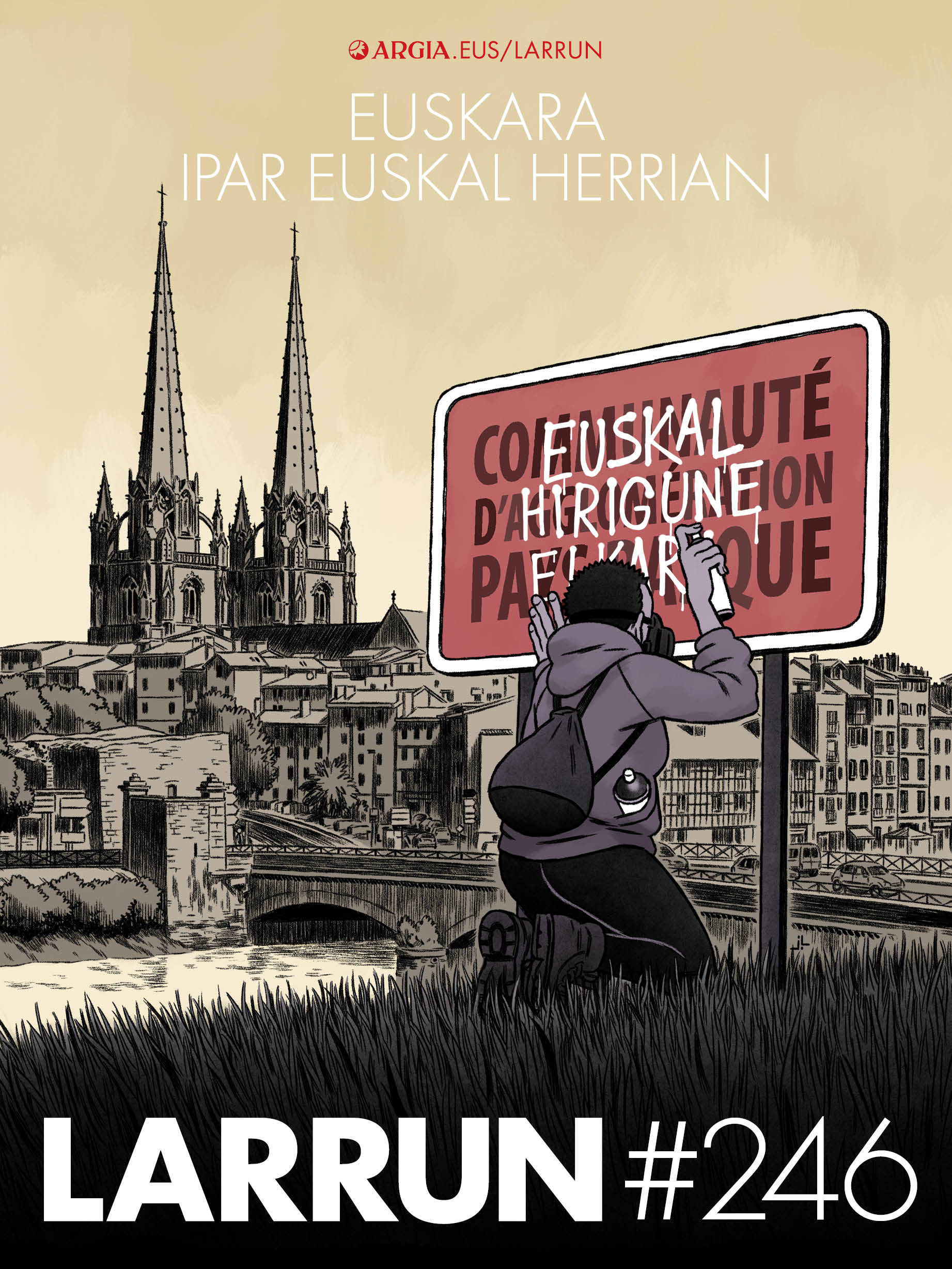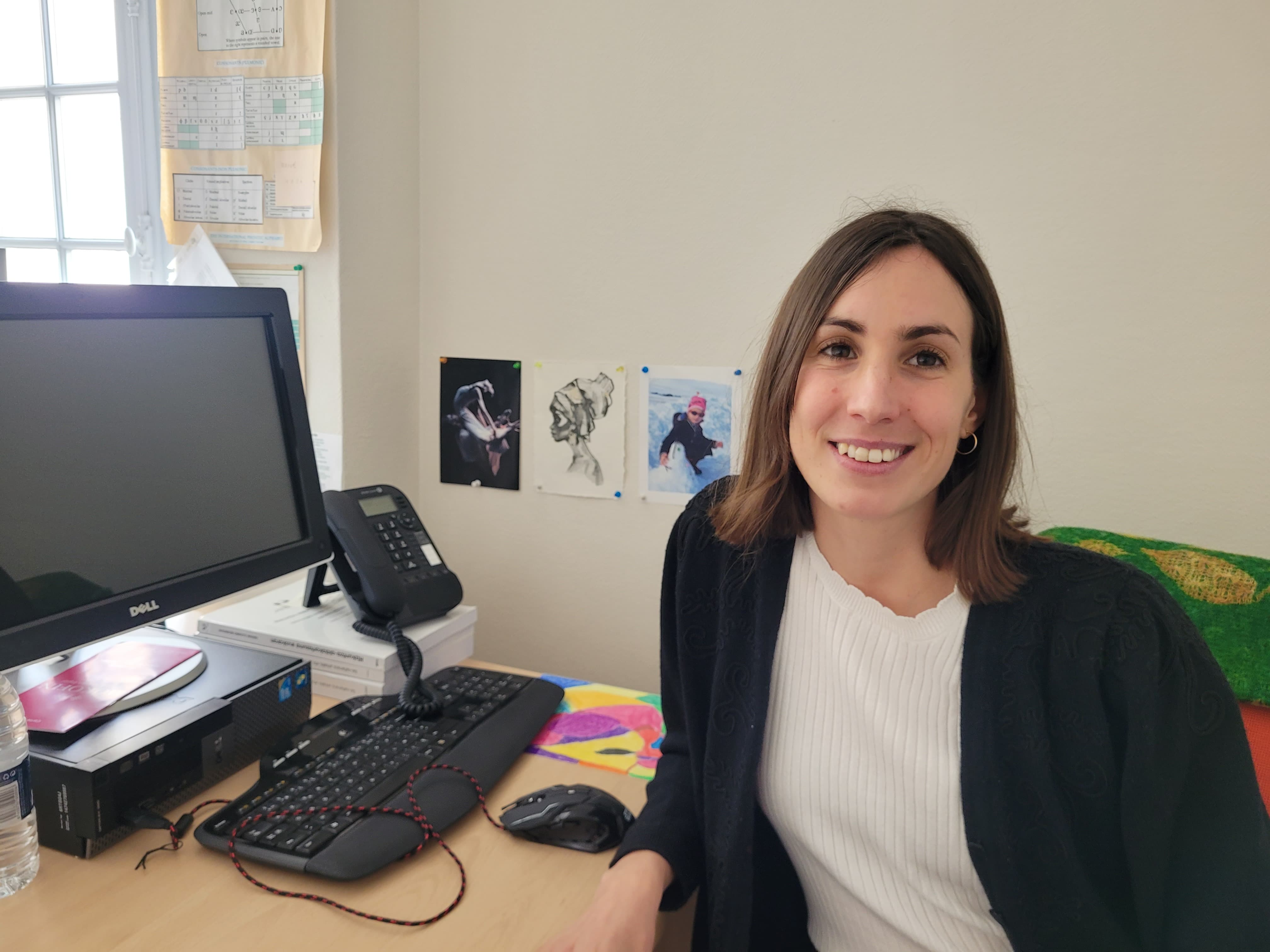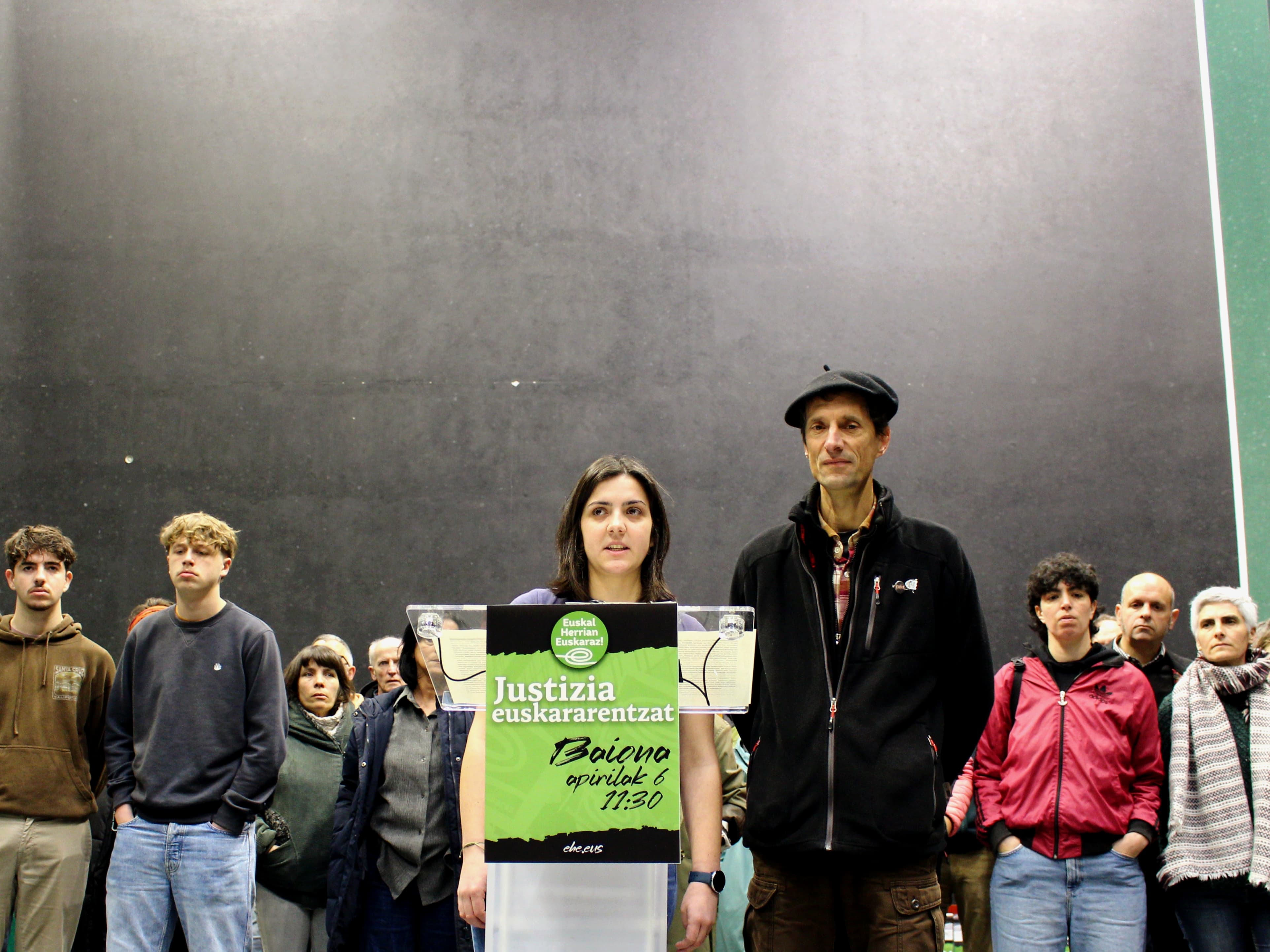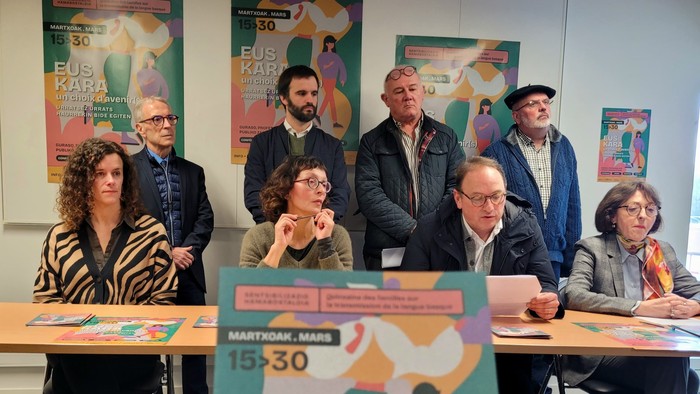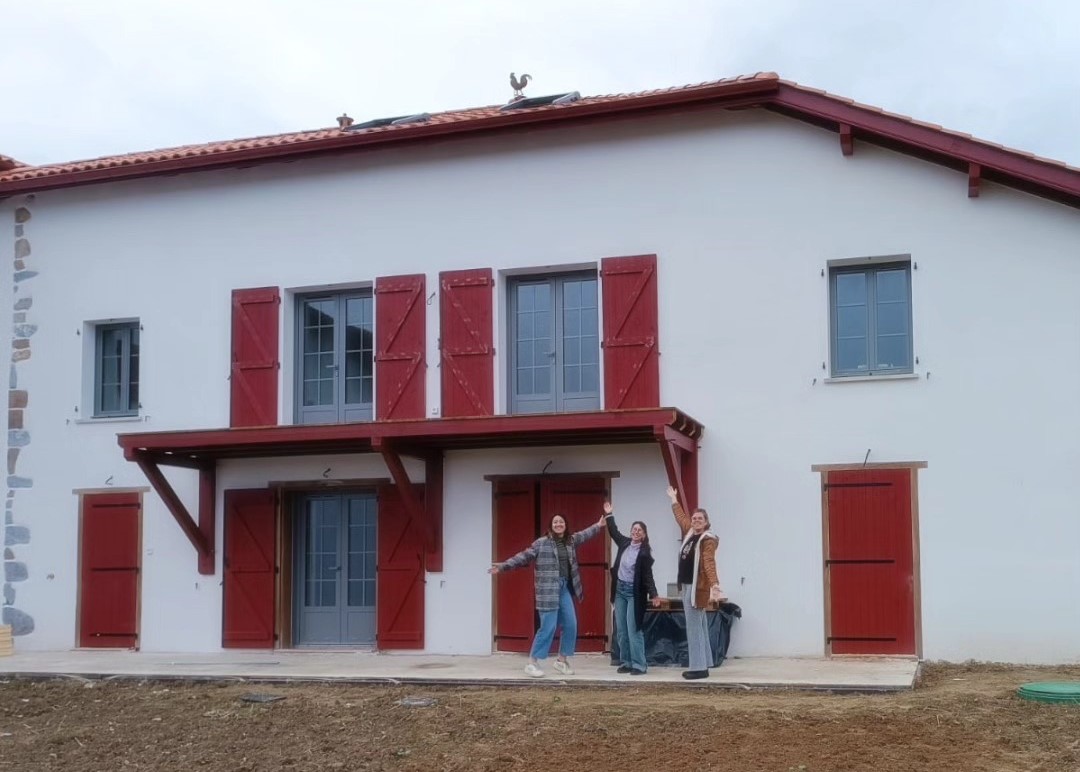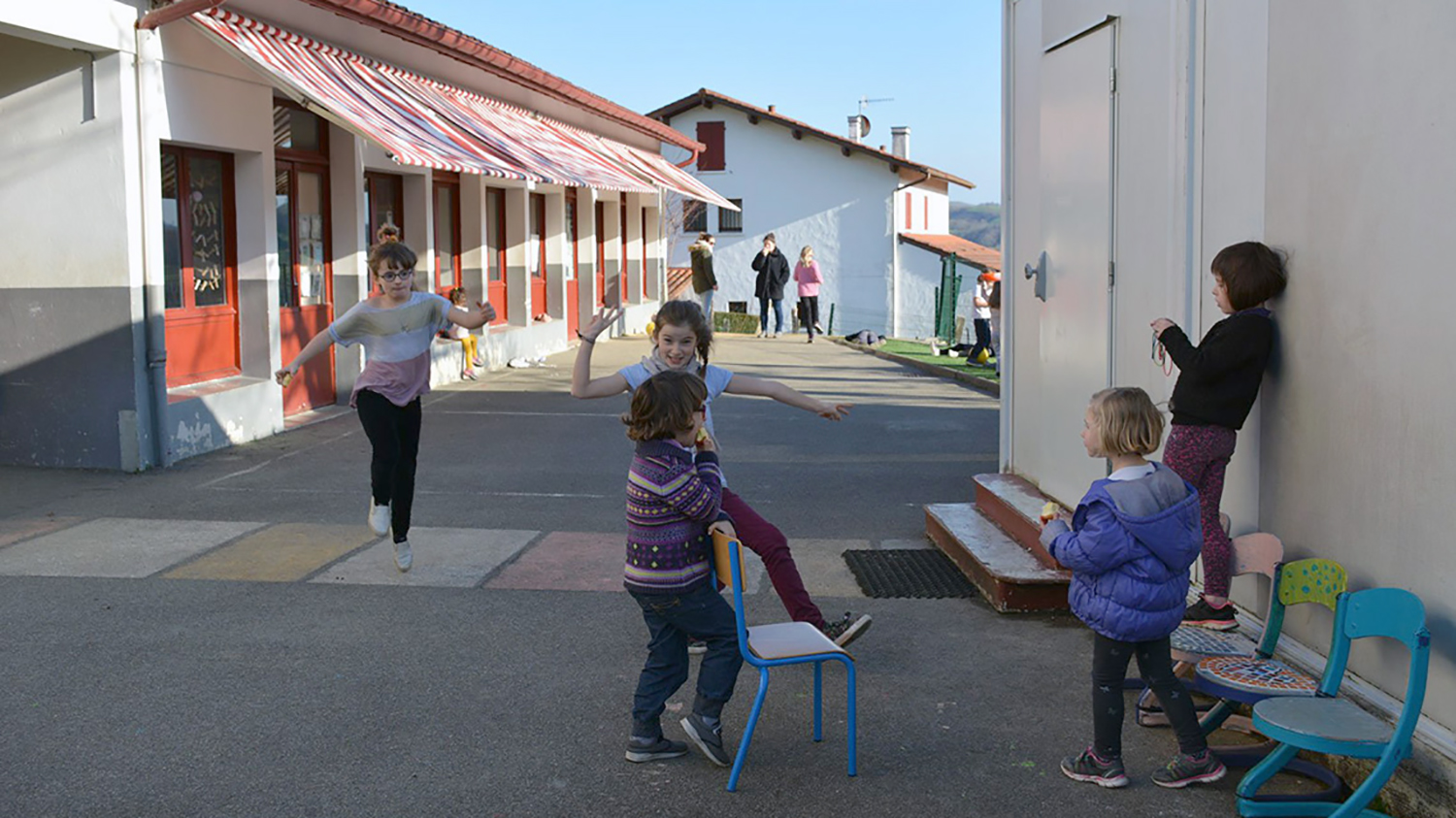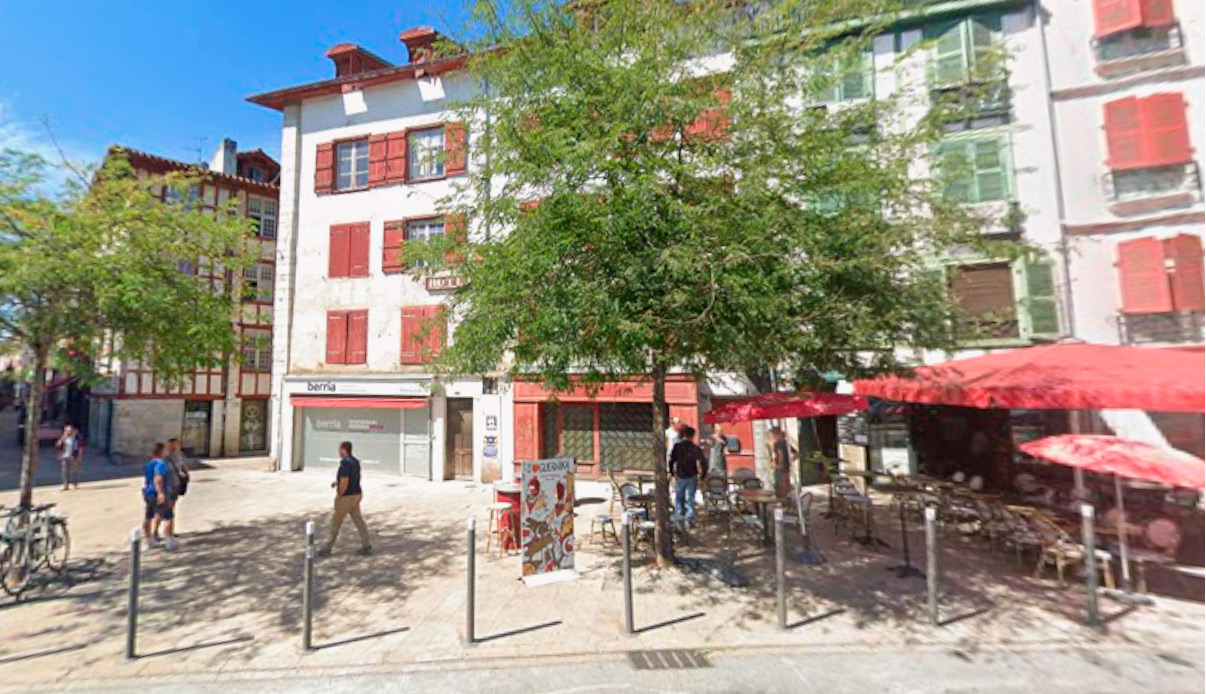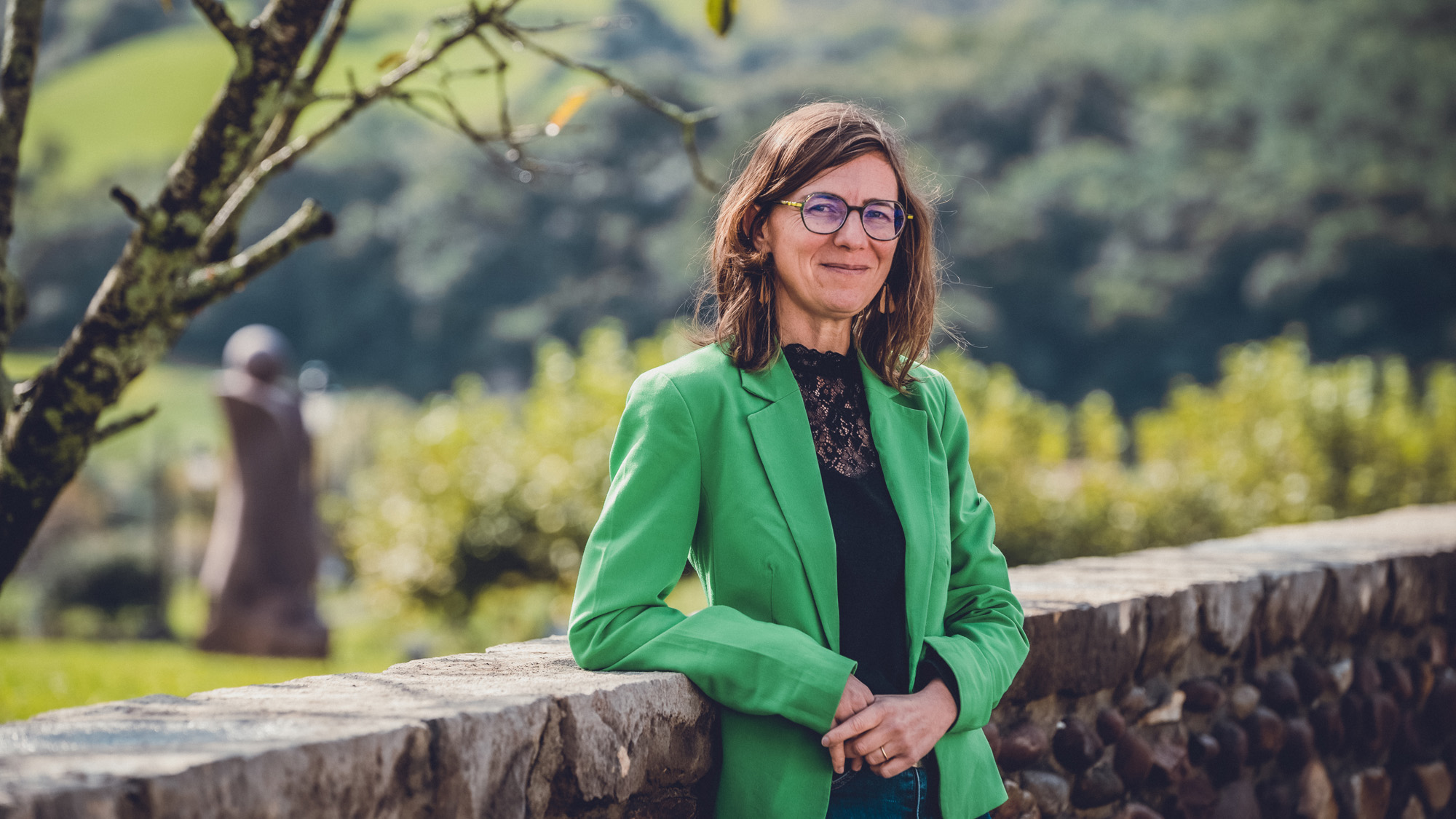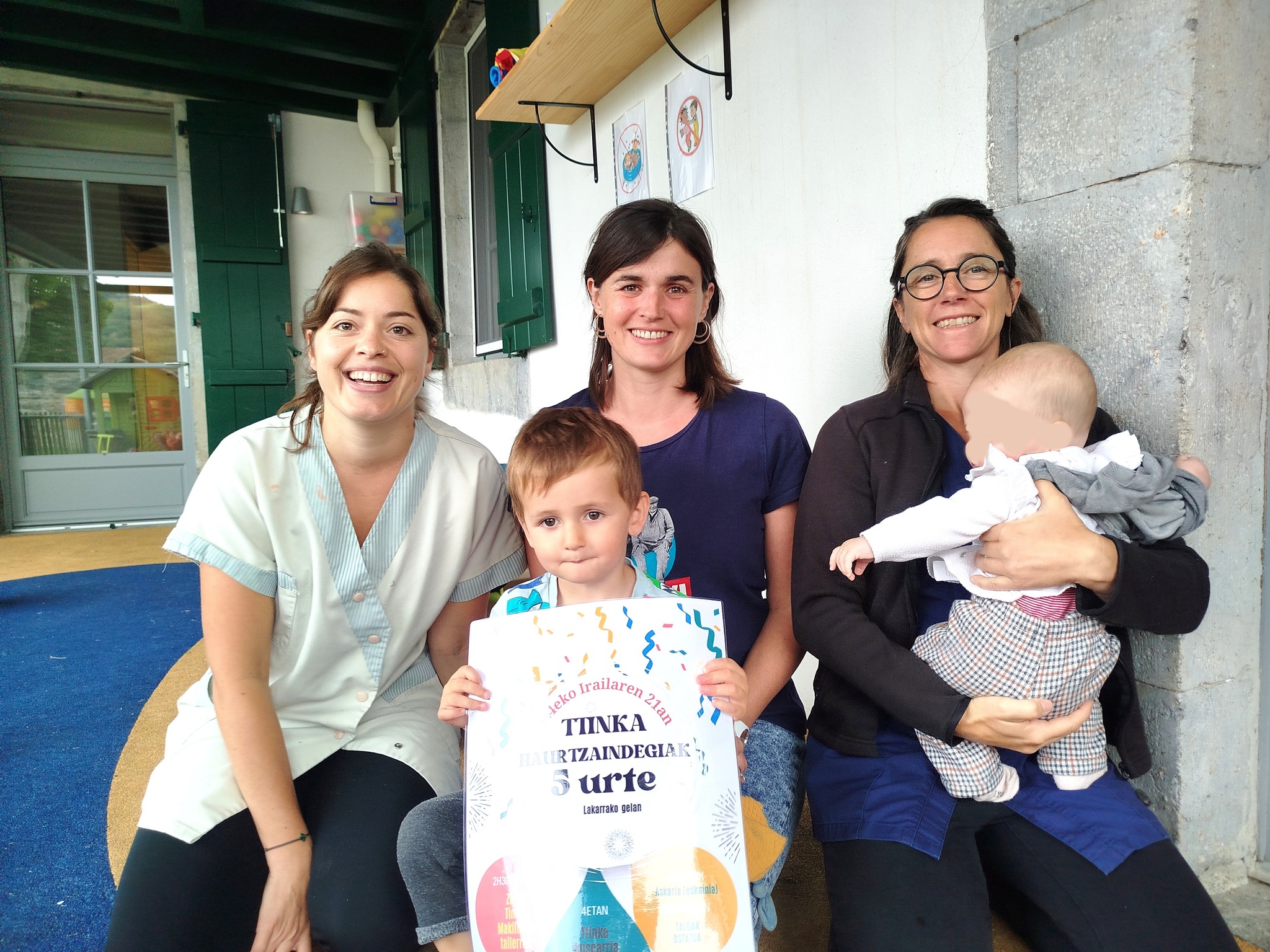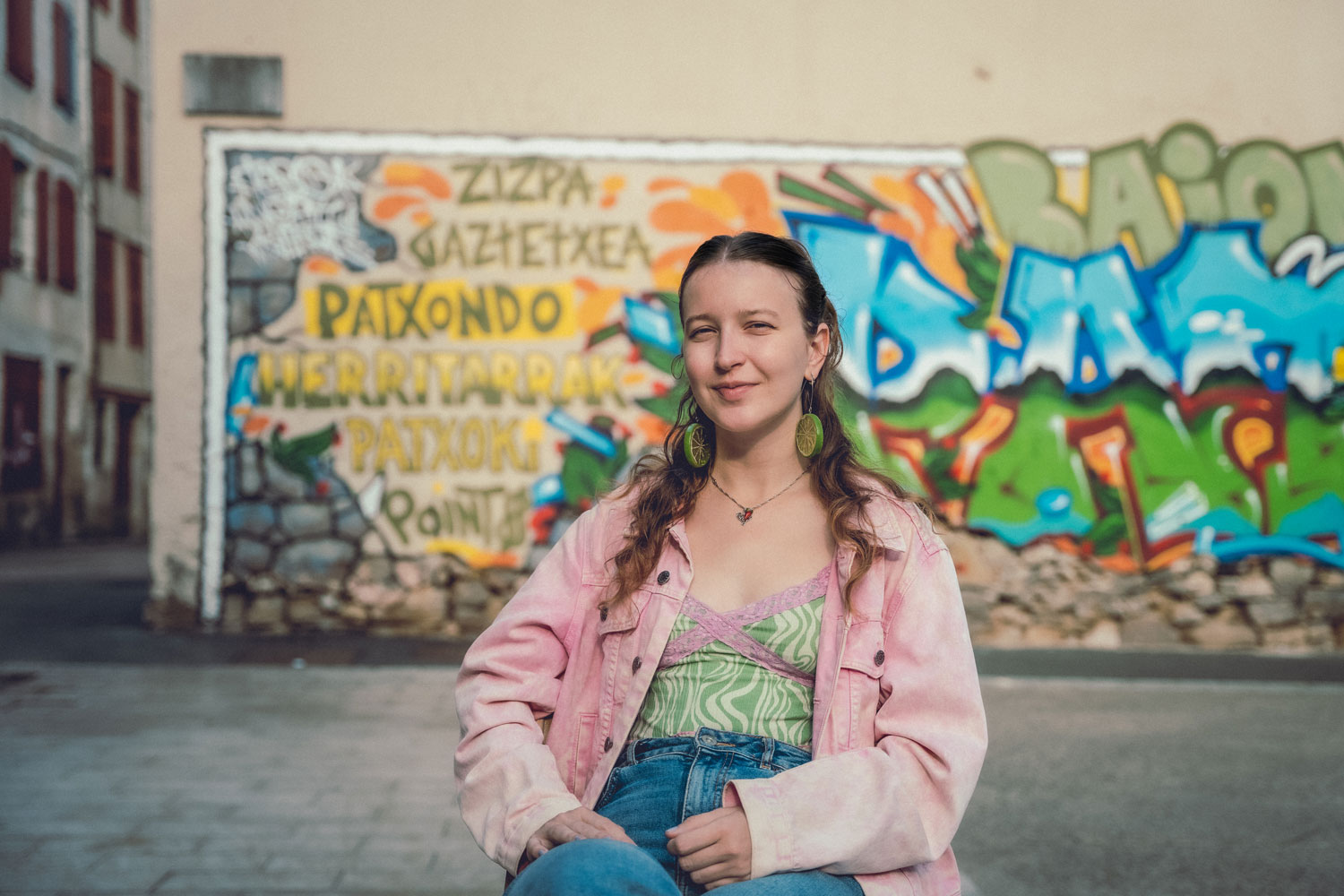It doesn't win the future, but it could win.
- On the occasion of the centenary of Argia, on 27 September we held a public table on the Basque Museum in Baiona, in collaboration with the Mintzalasai association of Ipar Euskal Herria. In Ipar Euskal Herria we talked about the Basque Country, after the creation of the Single Commonwealth of Iparralde. The meetings talked about the past of the Basque Country, but above all, explained the current situation of the Basque Country and underlined the potential or shortages that the Basque country has for the future, including expectations and frustrations. One of the conclusions of the round table has been that it is necessary to look forward to looking in the past. Mugarri mugarri, some of them: 60 years ago the idea of the Euskara Batua in Iparralde began. 50 years ago, SEASKA was born. For its part, AEK (Gau-eskola) has turned 40 years old, and the Basque radios too. Throughout these decades, numerous associations and popular movements have emerged. The Basque Cultural Institute (EKE), the Basque Confederation and the Basque Public Body (EEP) were then set up. They are also working today. The Basque Confederation of Football has especially gathered associations and groups in favor of the Basque Country to promote the institutionalization of Ipar Euskal Herria. Today, in 2017, the Single Commonwealth of Iparralde is created, a milestone between the past and the future. We got to talk about their work.

The Single Commonwealth of Iparralde created the Commonwealth of Iparralde in January 2017. What do you think is the linguistic policy that is being made around the Basque Country?
Jean Claude Iriart: The first thing to remember is this: With the creation of the Basque College, from the outset, the institution itself undertook to assume a competence related to linguistic policy. Perhaps that is the first decision that has been taken from the very beginning, very important. That does not mean, however, that he has taken over all the institutions, but has so far only assumed that competence to direct the policy of the Basque Country. In this regard, the work of the Basque College must be valued in relation to that carried out by the peoples that make up it. And that is, when the College has assumed this competence, it has taken part in the competition in Basque over the peoples, it has not taken either the State, the department or the region [Region of Aquitaine]. In any case, when the decision was taken, it was decided that the competences that the peoples managed in favor of the Basque country should continue to work as well, and that if they did not, the College should help these peoples more.
"The languages of the territories were recognized, Euskera as the Gascon, but although the recognition was official, this does not mean that they were granted the official
status" Jean Claude Iriart
That was the first decision, which was taken after a year – in June 2018 – and for two reasons. On the one hand, the language policy that the College intended to implement in different areas and some guidelines were established. Since then, there's an elect, a cabinet, a service, who's working all the time on this. In other words, this is the normal procedure in the development of any policy: when a competition is assumed, it must be defined after a year.
At the same time, it is very important, although very symbolic: the languages of the territories were recognized, such as the Basque Country and the Gascon, and although their recognition was official, this does not mean that they were granted official status. They have been given official status as a territorial language. In other words, it has been a genuinely symbolic attitude of principle, which does not give these languages or the Basque Country, therefore, the right to official status or to legality. To put it in some way, the community wants the Basque language to be a territorial language and has been accepted.
Eneko Bidegain: Jean Claude has clearly explained what the competences of the Basque College are, that is, they are not the competences of the French State, but some competences that the people want or ask. The State has granted territorial knowledge to the Basque Country, but it is not an official language. So, looking at the situation of the Basque Country in Ipar Euskal Herria and throughout Euskal Herria, and what future it may have depending on the current situation, it seems to me that the level of power that the College has is not enough to be able to make linguistic policy. That is, the Basque does not need symbolic recognition, the Basque needs all the place and knowledge, and not to be a secondary language.
For example, 40 years ago on the roads there was no sign in Euskera and now it has presence, so it's one more step. However, the signal in Basque is thinner, smaller. And in the official newsletters the Basque Country is equal, less and less and more difficult to read. So we have to think that the Basques have a better view, and perhaps AEK can run a campaign with the motto: “Kill at AEK, you’ll spend less on an eye doctor.” Excuse me seriously now. The sign of the streets and roads gives us a message every day: “The Basque language is a secondary language.”
"The level of power of the Commonwealth is not enough to be able to make language policy, the Basque country does not need symbolic recognition, the Basque country needs room and full knowledge, and is not a second language"
Eneko Bidegain
In the past, for a while, the signals that were in the French void were erased, and today they have given a symbolic place to the Basque in the background. This policy seems to me to be humiliating. Euskera is taking steps in teaching, but in the case of BA, only 20% of the population studies Euskera in schools. Moreover, in the ikastolas or in the schools Euskera is learned, but most of the extracurricular activities are in French. So, in a French world, taking into account the measures taken by the French language, I do not believe that today the Basque country has the help it needs. Not even if the Basque College has put some Basque technicians to work. France knows what aid it gives and to what extent it applies measures...
Marie Andrée Ouret: I'm not as pessimistic as Eneko. I believe that the creation of the Basque Commonwealth has been a great step forward. Five or six years ago we did not know that it was going to be created, because they were huge obstacles, the winds blowing against the Basque Country were enormous, but it has been created in the sand, and that shows that things can also change politically.
The College offers us great opportunities to work around the Basque country, and we must take advantage of them. The demonstrations that have taken place are important. Of course, the knowledge of the Basque country has become official, the official status of the Basque country has not been achieved, but we knew that this was impossible. We must therefore be content with that. However, it cannot be said that it is negligible, and it also has its symbolic value, in my image, if we have xantza, this Community is important, [Ipar] covers the entire territory of the Basque Country, and thanks to this it can give a policy to the Basque. That too is a lot. We have to see how far we can go. A powerful Community of this kind has power. Is the presence of Euskera not guaranteed in schools? Isn't that enough? I believe that the College is still new and that it will be an example for the peoples and also for the other communities. The steps it takes can be exemplary for them, for example, in the competencies that affect different areas of work, in all the services it brings to the public, all of them will be winning things. If the College behaves rather boldly, we can go a long way in those areas. I am working at the House of the People of Baiona, and I see that it is difficult to move forward. But this is the first time we have worked in Euskera in this area, when for the first time you have a meeting in Euskera, it is rare, but then it is gradually normalizing. And you go ahead. Same thing when you do a cultural animation. So if there have been roads, and we have to break them.
J. The great C. Iriart: Listening to Eneko, it may be appropriate to clarify that each institution does what it wants in its areas of competence, and that is what we really need to know and take clearly, because that is the case. In other words, in the linguistic landscape that we live every day, we can see the services that the institutions organize. These include those carried out by the State, those carried out by regional and departmental departments, as well as rural houses and social services. And now there are those who carry out the Basque College directly. I would like to say that the everyday landscape is not managed by a single institution. As for the use of Euskera, each manages it according to his/her choice. The Commonwealth has the possibility of doing its own thing, so far we cannot say that it is doing everything that the law allows, important steps have been taken, and we have realised that it is more easily done than before, and there is more to do. As Marie Andrée has said, the Basque College can be an example for local communities. What are the peoples doing more? Yes. But most of them do so less than college. Clearly, the state, region and department should not be the reference or model of the Single Commonwealth of Iparralde. For them the Basque model is different, for the State (except in teaching) Euskera has no place in daily life. Very little for the counties and for the department. These institutions are not managed from Euskal Herria. The limitations of Euskera are linked to the competencies of Euskal Herria. If one day the Basque College had more competences and more developed, it could give more or less aid to the Basque Country. The limits of the Basque Country are related to the competences of the Single Commonwealth of Iparralde.
We’ve seen two posturas.Se can make a policy possible, but Bidegain believes there’s a certain risk there.
R. Bidegain: For me, my welcome to all the steps that are taken, but we do not have to dazzle it. I will make a comparison: it has recently been the week of climate change, there have been several demonstrations that have been carried out, and how such measures have been taken. But seriously, what measures have been taken? The students have expressed themselves... And what? It would be otherwise if a private car use strike had been carried out, right? Or if a public transport strike had been carried out, the train strike, for example, Ipar Euskal Herria could be collapsed. They're called climate mobilizations, but basically nothing is done. We can compare this situation with the policy on the Basque country: some measures are also taken in the Basque country, but always looking at the long term, so that our conscience is calm in the present. Today, taking into account the power of the French language, at the time of globalization, we run, and in that career some small measures are not worth enough in the emergency situation of the Basque country, in the situation of threat that it lives. Excuse me, I see the situation as black, but as black as the climate situation I see it in the Basque Country. The sea level will rise by one meter by the end of this century, I hope the Basque is alive then, but taking only the current measures I do not think it will live long.
60 years ago, it was the beginning of Euskara Batua, as it occurs in Iparralde. 50 years after the birth of SEASKA. AEK (Gau-eskola) is 40 years old, and the Basque radios are also. Institutions and movements were created from the people. As well as the Basque Cultural Institute (EKE). In the opinion of some Euskaltzales, time has passed and another time has come. The article Euskalgintza zaharra and berria has appeared in the press. Is there any change?
"The official knowledge of the Basque country has been given, the official status of the Basque country has not been achieved, but we knew it was impossible. We must therefore be content with this. However, it cannot be said that it is insignificant and symbolically has its value"
Marie Andrée Ouret
M. A. Ouret: It's a difficult question. I do not know if it is old and new Euskalgintza. New, maybe because he's old. I don't know if bilingual schools are there, to start with. If I compare the Basque lovers of our time with those of today, today there is more awareness, people are more aware and more politicized. For example, young people who have been educated in SEASKA are more used in mobilization. Many of them are now fathers and mothers of SEASKA, who demonstrate a different attitude to what once existed in relation to the Basque Country, they are more aware of the situation of the Basque Country. In youth there is everything, of course, but their marches are very political, also the activities they carry out, I don’t know if that is the new Euskalgintza…
Moreover, it is clear that the families of SEASKA and bilingual schools – public and religious – are not the same public. If so, in Seaska the students are increasing, in 1st and 2nd, 4,000 are increasing. Level 4. There's a mass. Then, of course, the two are not the same public. I see them in public school. In public and religious schools, even if they don't want to be generalized, they don't have to worry about Euskera, children learn because their parents have seen that Euskera knowledge is a plus, and it's already there. Even if that is the limit or the problem. In fact, there are many children entering this system, increasingly choosing bilingual schools in mother's schools, but seeing their trajectory, they abandon Euskera's learning from the second year onwards. The truth is that there is not much attachment, it is an election that is made for opportunity, obviously you will not find a militant audience. Basically, in the school they are related to the Basque Country, but outside they do not give continuity.
We can say, however, that the Basque country has gained some sort of prestige.
M. A. Ouret: I do not know if it is more prestigious, but at least the Basque is more attractive today than in our childhood and youth stage. Fathers and mothers choose for various reasons the schooling in Basque. They think that they will also learn more easily other languages and see Basque learning as a way to integrate. That's where we go.
"If I said in French everything I'm saying, my expressions would be more rigorous, my richest dictionary, I would make my ideas clearer.
I don't think it's the only case"
Jean Claude Iriart
J. The great C. Iriart: New euskalgintza? You mentioned past times: 30-40-50-60 years ago local associations were particularly committed to marches in favour of the Basque country. Since 1990, the institutions also began to work on this, and then we saw that first institutional policies were being developed in favor of the Basque Country. I would not say that there are old, classic and new Euskera; there are associations in Euskera, and these have not been reduced or changed, but have given a rather positive evolution. The intervention of the institutions has not weakened the power and commitment of the associations, and I can say, at the same time, that public Euskalgintza has appeared.
Associations and institutions are not confronted with each other and the forces for the Basque Country are growing. The institutions have begun to establish a Basque policy. At that time there was not a single source of budgeted revenue, where there has been a significant change. A large number of institutions subsidize the work carried out by the associations, which as such has become a public Basque, and this has only accelerated it in the last 60 years. Of course, we have to warn that all these steps that have been taken in favour of the Basque Country do not guarantee the future of the Basque Country. We cannot say that we have come out of a difficult situation. It can be said, however, that the decline of the Basque country has stopped, it is also true, that it was very low, and therefore we cannot say that this struggle is a victory. So we have to keep in mind that the state is dark, but there are also some rays of hope. We cannot say that Euskera wins the future, but it can win. We have to see what the institutions and society will do in the years to come, there are social and institutional limits. If we were all prepared to learn and use the Basque language, we would not need the institutions. But the reality is not that way.
R. Bidegain: Two words on the Euskalgintza zaharra and the new one: this issue has spread especially in the South, from what Argian Bea Salaberri wrote in response to an article written earlier. That which is called Euskalgintza zaharra, was written by a critic of Hegoalde taking into account the entire Basque Country: AEK, EHE, Kontseilua, Ikastolen Elkartea and other groups referred to this issue. Some say that what is called "euskalgintza zaharra" has got into a crisis, has got into a dream, and they say that something needs to be done to create a new Euskalgintza. In a way, Bea Salaberri responded to that. In Ipar Euskal Herria, for example, AEK and SEASKA, they have several subsidies and if there were not, they would not have gone ahead, it must be stressed. However, the existing economic policy is not sufficient to meet all the needs of the Basque Country. Mention has been made of the need for a new Euskera, as some groups on the Left are concerned about the situation in the Basque country. Perhaps they have begun to argue that “Euskera and Euskera must be politicized”. For example, for some, the Basque Government has to be a question or a political request.
AEK, SEASKA, EKE, Confederación Vasca, Herriko Etxeak. There are countless organizations. The Single Commonwealth of Iparralde has been created, but it is also EEP, EKE… Is there any way to join?
R. Bidegain: One of the characteristics of the Basque country is the atomization of the associations, of these institutions. However, the associations and groups working for the Basque country have different functions, each one has its own, so I see no problem. There is a bridge between the Houses of the People, the Basque College and the Basque Confederation with regard to Basque cultural activity, and the associations and groups of the Basque Country are also working on this task, but, as it could not otherwise be, some have their hands tied by economic aid. In my opinion, over time, the pressure of many groups that are in the Basque Confederation has disappeared, groups or movements that in the past pressured and made deaf ears to money, made a counter-power in favor of the Basque Government. Today, the others, who work under the supervision of the institutional institutions, cannot exert pressure. But I would make a distinction, for example, between those who are involved in education or the media. That is why, in my opinion, in the Basque world we need three legs: the institutional, the semi-institutional and those who work outside them.
On teaching: Are there links between public and Catholic schools and Seaska?
M. A. Ouret: It's about relationships. The Basque Confederation has been mentioned in a communiqué, in which groups and associations that support the Basque Country and have a subsidy, but not the Basque Confederation, meet. Therefore, it does not have difficulties to exert pressure, it does have capacity. If it's high, whether it affects or not, that's another thing. Therefore, within the Basque Confederation we bring together bilingual – public and Catholic – schools as SEASKA meets, and we have a space for interaction and dialogue. In recent years, however, we have had quite serious moments, we have acted separately. For example, the reforms that National Co-education regularly brings out, such as school reforms, are detrimental to school departments, have a particular impact on languages and are worrying measures. However, despite the most serious moments, we have come together and organised activities together.
"The students learn Euskera more and more in one place, but we would not want it or need it to ensure the quality of the
Basque" Jean Claude Iriart
J. The great C. Iriart: For me there is no problem of cooperation between different institutions, there is no special problem. It is true, however, that the Basque Confederation has somehow stopped its work of pressure. I think that is what it feels, but I think it is behaving very well. To say more about pressure, another – rather new – era would be welcome, and other groups could exert that pressure to influence more. That does not seem to me that the great agents working in Basque, AEK, SEASKA, etc., are blocked by political institutions, because they have a subsidy. They maintain the autonomy to assert their claims, if they have capacity they have not weakened in it. Clearly, if there are limits, on the one hand, if the population were to press more, the elected officials could do more. But the remaining pressure should be placed on the institutions that are beyond Euskal Herria: The department of [Atlantic Pyrenees], the region of [Aquitaine] and pressure on the state, but that is, to be honest, difficult. There is nothing more to do with the territory of Ipar Euskal Herria than with the French territory. Obviously, if we pressed more, that would have better consequences. However, I believe that the new avenues allowed by current legislation, both in the Houses of the People and in the Basque Community, have not been sufficiently overstretched. If there is a chance of progress, all the options must be broken.
Does the Basque Country have your space 50 years ago and the current one is the same? Has the corpus of the then Basque “character or essence” been enriched or impoverished? What has changed the situation in the Basque Country?
R. Bidegain: Until 50 years ago, Euskera was the language of the house in Iparralde, surely in the world of agriculture, had no place in the public space. Today, it has public space, much less at home, in the private sphere. This has been the change, but in the public sphere its place is symbolic, it is not enough to cope with the loss suffered by the Basque Country. Specifically, with regard to the corpus of Euskera, the material and matter of Euskera have been enriched, thanks, among other things, to teaching and university. Thanks to the press in Basque, every day the press is there – Argia is 100 years old: zorionak! –, Berria and the locals; literature, on the other hand, etc. Naski, in Iparralde, you might not notice that much. This creation does not easily reach people. For example, if a movie comes out in Euskera, it's before a project in New York than it is in Hendaia. This leads him to lose some prestige to the Basque Country in Iparralde. There is also great production, but at the same time precarious. The production of the Basque language among the speakers, especially in Lapurdi, is unfortunately modest. It follows the pause in the transmission of Euskera. In Lapurdi there is a sufficient number of Euskaldunes that do not have the ability to communicate. That is, if people do not develop well with vocabulary and grammar in Basque or in any language, it is difficult to conduct daily conversation in that language. So, the number of Euskaldunes has increased in Lapurdi, but it does not have enough Basque level to be able to speak with ease. With an Basque in Spanish you cannot make a strong Basque community, besides there are those who dominate the Basque country well, but due to their work, they live outside the Basque Country. Therefore, we lose many Euskaldunes that are created in daily relationships. So many Euskaldunes have been created, but many are lost along the way. If there is the corpus of the Basque Country, on the one hand, we have achieved a rich production, but, at the same time, there is a rupture. The literature and the press must therefore be further promoted, among other things.
M. A. Ouret: I have known the Basque in a very small town, in Suhuskun [Baxenabarre]. At that time, all the people, all the Suhuskanians, spoke Basque, all of them knew it. The Basque people did not learn, knew or did not know. No one was learning about the Basque language, however, the Basque language was very limited, it remained within the realm of the people, in the normal culture. People lived among them, we weren't literate, there were a lot of voids. Today, the difference is great, we must thank, among other things, the work done in schools. Young people leaving SEASKA are literate, at least in theory speak Basque. They have linguistic tools. On the contrary, the truth is that when they leave school they do not speak Basque, if there are many belarriprest, on the contrary, 50 years ago in Suhuskun they were all drowning.
I don't want to criticize anyone, but we look around us, at my work, and the young people are on a low level. We need critical mass, they say, we need breathing spaces to live in our language, that talking critical mass we haven't yet reached, and we also need good speakers, speakers who have the level of teachers to speak and teach in Basque. At the moment we are in a critical situation, some things have been won and others have been lost. The Basque of the Suhuskunes was limited, but those who today have fewer borders do not use the Basque language enough.
"It is necessary to become aware and even if the Basque language was the official language it would not
be
saved" Eneko Bidegain
R. Bidegain: In line with Mari André, essayist Joxe Manuel Odriozola explains it perfectly in one of his last books: until 50 years ago, the nations of the state, that is, the administrations that had the power, intervened in peoples without national conscience. For example, in the world of agriculture, Euskera lived in comparison to French, but when the economy changed, when industries and cities spread, and even media accelerated, Euskera collapsed. French became a national language, in which French – like Spanish in the South – became fully established in the administration. Since then, the Basque language has not been recognized or assigned to the function of the national language. When the new social organization was created, Euskera did not reach the same proportion as neighboring languages. Fortunately, the unified Basque country has contributed to the construction of our language, that is where we are. It is essential to realize this by understanding the situations that depend on the Basque Country.
J. The great C. Iriart: In this respect, Marie Andrée referred to Belarriprest and Ahobizi. Following the imagination of the interlocutors, it seems to me that bilingualism is not entirely balanced between living speakers. I'm going to take my example, if I said in French everything I'm saying today, my expressions would be more rigorous, my richest dictionary, I would make my ideas clearer. I do not think that is the only case. It seems to me that among bilinguals, also among the drowning, there are those who dominate French better than the Basque. This means that – if both languages are not mastered to the same extent – we are easily slipping into French. This has its consequences on the quality of the Basque Country that we use throughout the day. In general, if we look at the young people who study at school, those who follow the teaching to the terminal are bilingual, but very few also maintain the same proportion or level as the two languages. In other words, students are learning Basque more and more, but we would not want it or need it to ensure the quality of the Basque country somewhere. In general, therefore, we have become impoverished.
Finally, do institutional representatives, elected, learn or use the Basque language?
J. The great C. Iriart: The elected officials are like everyone else, there is no difference in that. To begin with, the elect cross with citizenship throughout the day, they are members of society, but the bond with the Basque is quite personal, and whether or not they practice it, whether they matter or not. Same as the other countrymen of society.
Asking for the public
.jpg)
Eneko, you have emphasised the limitations and difficulties of the Commonwealth of Iparralde. Where should more force be done?
R. Bidegain: Unfortunately, this question is being asked, but no solutions have been found. I believe that, for the time being, it is necessary to become aware, and even if the Basque language was the official language, it would not be saved. This fact is also noted in the Autonomous Community of the Basque Country (CAV). Except in very Basque regions, Euskera is not healthy, many cut off relations with Euskera after completion of education. So, it's a way out, or maybe it's, to euskaldunify the world of work, to euskaldunify the economy, to euskaldunify the realms of everyday life, that's the priority. For example, if we were to opt for Euskaldunizar the world of work, this would facilitate relations, the exchange between the companies of Hegoalde and Iparralde, which would facilitate Euskaldunization and leisure in Euskera. However, the economy is partly linked to leisure today.
"For Euskera to remain alive, it takes 25% of the population's speakers. According to the latest surveys, in Iparralde we are at 21%"
Marie Andrée Ouret
M. A. Ouret: OK. Many more things can also be done in teaching. You mentioned the risks Mikel [Asurmendi]. It is true that the institutions have done a great deal in recent years, we are almost completely separate, and the steps that have been taken are obvious, but there is a risk that more steps will be taken to think that they will be done quickly and easily. A few years ago, a Territorial Contract was signed with the state, signed by several collectivities. The Basque country also played its part. The meeting of the Basque Country was held, the needs of the Basque Country were defined, it was decided to accelerate the promotion of the ikastolas and the new schools, among others cosas.La Confederación Vasca – according to the UNESCO document – published the classification of the language: to keep the Basque Country alive, it is necessary that 25% of the population speak. According to the latest surveys, in Ipar Euskal Herria we are at 21%. It goes up, it goes up. But we're still not up to it. In other words, although there are signs in favour, the Basque country is in the car. The Basque Confederation said that the Basque area must be speeded up, that more bilingual schools must be opened, that all children should study in Basque in order to deal with the fall they are suffering. For example, if all boys and girls were studying in the SEASKA model, we could reach 35% of the speakers. If we really want to deal with the situation in the Basque Country, there is still much to be done in schools. For example, Corsica is also working on that, and all public schools want them to be bilingual. We, too, therefore need to take further action and take further steps.
Do you see it necessary to organize respiratory areas and informal areas to speak in Basque?
R. Bidegain: In the Northern Basque Country it is not easy to organize them, especially on the coast. For example, there are major difficulties in service areas or in shops. As I see it, new media must be created, such as applications on mobile phones. Through them you can facilitate the accommodation or camping where we can find the Euskaldunes, and thus update the map of the Basques. In our environment, knowing that they will speak to us in Basque can help us live in Basque every day. This would perhaps help to strengthen communication between the Basques.

Mintzalasai festibalaren 8. edizioa prestatzeko 90 laguntzailek lan egin dute irailaren asteburuetan. Astelehenetik ostiralera 500 lagunek parte hartu dute euskarazko aktibitateetan, euskaraz bizi nahi duen jendea badela frogatuz. Bizki pozik gaude erantzunarekin. Aurtengo ekimena baikorra izan da. Euskararen aldeko nahikaria eta atxikimendua badela erakutsi digu.
Mintzalasai-ren hiru ezaugarri azpimarratu nahi nituzke:
Urbanoa edo hirikoa. BAB hiri-eremuan (Baiona-Angelu-Biarritz) kokatua izan baita, Euskararen etorkizuna bertan jokatzen da neurria handi batean eta erdaldun gune horiek jostaleku estrategiko bihurtu nahi ditugu.
Hibridoa. Ekimenak administrazioaren baliabideak eta elkartegintzaren ausardia uztartuz funtzionatzen du, mugimendu euskaltzalea berrasmatuz eta lankidetza sinergiak azkartuz.
Hiperaktiboa. Iraileko festibalaz gain, beste ekimen asko antolatu dugu: Mintzalasai ikastetxeetan sartze garaian eskoletako haurrei euskaran birmurgiltzeko aukerak eskaintzeko eta Mintzalasai euskaltegietan ekainean, ikasturte bukaeran euskara ikasten duten 550 helduei momentu pribilegiatuak eskaintzeko. Testuingurua zein den ez dugu ahanzten: hiru hiri hauetan, haurren %80ak ez du euskara ikasten ez etxean ez eta eskolan. Gure aldetik, molde xume eta konkretuan ekintzak obratzen segitzen dugu.
Euskara Ipar Euskal Herrian, Euskal Elkargoa sortu ondoren mahai-inguruan Euskalgintza zaharra eta berria aipatu da. Beti izan da dikotomia markatzeko joera bat: euskalgintza instituzionala versus euskalgintza soziala, zaharra versus berria, sektoriala versus integrala… Mintzalasai ekimenaren sustatzaileoi Euskal Herrian zerbaiten atarian gaudela iruditzen zaigu, zerbait berria sortzen ari dela.
Etorkizuneko hizkuntza politika publikoak gure mobilizazioaren araberakoak izan dira. Eskaera
eta presio soziala giltza dira
Nik uste, 60-70eko hamarkadetan aritu zirenen eta gaur egun ari garenon artean lotura eta segida dagoela. Besteak beste, gau-eskolen, ikastolen eta hedabideen –euskal irratiak eta abar– lanaren poderioz heldu gara 2010eko hamarkada honetara, eta zinez, denbora biziki laburrean sekulako aitzinamenduak izan dira euskararen alorrean. Eta, beharbada, hor dago beste dikotomia bat: aldaketa hauen lekuko izan den aitzindarien belaunaldia alde batetik, luzaz haizeak kontra borrokatu dena eta beste aldetik oinordekoen belaunaldi gazteagoa, euskara naturalago bizi duena, lorpen soziala ez balitz bezala. Ikastolak etxeko garajetik prefabrikatuetara pasa dira eta ondotik hormigoizko paretetatik azken teknologietako eraikinetara. Euskararen aldeko manifak gas negargarriekin bukatzen ziren duela 30 urte; gaur egun senatari frantsesen diskurtsoekin…
Bistan da, euskalgintzan ari garenok uste dugu hala ere, euskarak ez duela behar duen ahalmen guztia. Erraten da egungo gazteek ez dutela aurreko belaunaldiek zuten jite bera, alta, egungo gazte-gazteak, azken belaunaldiak, ez dira ahulagoak horregatik: gaztetxeak, musika festibalak, bertso saioak, libertimenduak, kabalkadak… horren lekuko dira. Ez dugu ezkor izan behar. Nire garaian, ezkerreko mugimendu iraultzailean hizkuntza nagusia frantsesa zen, eta gaur egun gazteak beren eguneroko bizimodua euskaraz egiten dute molde aski naturalean. Oinordeko azken belaunaldia inspirazio iturria da: desobedientzia eta euskararen aldeko errebeldia lantzen ditu. Nik biziki interesgarria hatzematen dut. Egunero, karrikatik etxera sartzean baikor izan nahi dut, ekintzaile izateko gauzak aldatzeko gaitasuna dugula sinetsi behar dugulako.
Azkenik, hauxe gehitu nahi dut: etorkizuneko hizkuntza politika publikoak gure mobilizazioaren araberakoak izan dira. Eskaera eta presio soziala giltza dira.
Euskal hizkuntzalaritza esperimentaleko katedra berria estreinatu dute Baionako fakultatean.
25 bat eragilek adierazi diete elkartasuna apirilaren 11n Baionako auzitegian epaituko dituzten Intza Gurrutxaga eta Gorka Torre Euskal Herrian Euskaraz taldeko kideei. Egun batzuk lehenago, apirilaren 6an Baionan eginen den manifestazioan parte hartzeko deia ere luzatu dute.
Plazara, AEK, Uda Leku, Dindaia eta Ebete antolakundeak Baionan elkartu dira Famili'on egonaldi ibiltariaren lehen edizioa aurkezteko. Hizkuntza mailaren arabera eskaintza bat edo beste egongo da eta haur zein gurasoentzat izango da udaberrian.
Hizkuntzarako ere gurasoak haurrentzako eredu direla kontuan hartuta, euskararen erabilera eta irakaskuntzari buruz sentsibilizatzeko helburua duen hamabostaldia antolatu dute Hendaia, Urruña, Donibane Lohizune eta Ziburuko herriek. Martxoaren 15etik 30era guraso... [+]
Nafarroa Beherean, Aiherrako 'Beltzegitea' etxean kokatuko da Eguzkilore haurtzain-etxe berria. Euskara, natura eta motrizitate librea oinarri harturik, heldu den apirilean hasiko dira zerbitzua eskaintzen.
The problem of the afrancession of the names of the places of Euskal Herria is not only due to the lack of consideration of the language in the signaling panels, but also to the execution of a decision on the domiciliation that was taken a few years ago.
Ultimately, the... [+]
Larunbatean ospatu dituzte Ttinka mikro haurtzaindegiaren bost urteak Lakarran. Baxe Nafarroko euskara hutsezko egitura bakarra da, Euskararen Erakunde Publikoaren B ziurtagiriduna.
On May 17, five Euskaltzales of Ipar and Hego Euskal Herria performed an action coinciding with the call made by the students of the Bernat Etxepare lyceum to mobilize in favor of the Basque. On the wall of the Baiona Subprefecture, a message was sent to the authorities of the... [+]
“Geldi euskara zapaltzea” lema berriz hartu du Euskal Herrian Euskaraz taldeak larunbatean egin duen prentsaurrekoan. Maiatzaren 17an, esaldi hori Baionako suprefeturan tindatzeaz akusaturik, irailaren 10ean epaituko dute Gorka Roca Torre.









